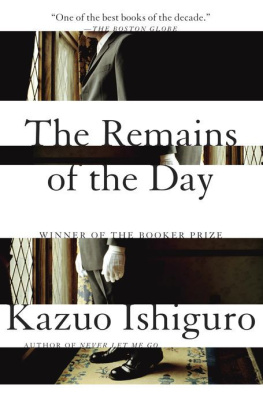The Remains of the Day is Ishiguros third novel. It was published in 1989, and in addition to receiving the Man Booker Prize for Fiction that same year, it was later adapted for the screen in what would be a critically acclaimed production starring Emma Thompson and Anthony Hopkins.
The story unfolds during the first half of the 20 th century and takes place in a grand old English hall, Darlington Hall, which is located in Oxfordshire. The novel is comprised of diary entries from Stevens, the head butler of the Hall, who is now in the waning years of his life and career. In these entries, Stevens both describes his memories of the former days of Darlington Hall and tells of his current journey to Cornwall, where he is to pay a visit to one of his former colleagues, Miss Kenton. Through Stevens reflections concerning his life as a butler, his relationship with Miss Kenton and his loyalty to his employer Lord Darlington, Ishiguro problematises the themes of servitude, restraint and meaning.
SUMMARY
STEVENS TRIP BEGINS: FROM DARLINGTON HALL TO SALISBURY
The novel opens in 1956. Stevens, our protagonist and narrator, is the head butler of Darlington Hall, a historic English hall that has recently been purchased by an American man named Mr Farraday, who urges Stevens to take a trip somewhere as a sort of break to his work. Stevens agrees to the proposition. He has found that the Hall is somewhat understaffed and has recently received a letter from the former head housekeeper, Miss Kenton, who expresses nostalgia for Darlington Hall and her old position. Stevens believes that by travelling to Cornwall he would be able to enjoy some leisurely motoring in the English countryside and also pay a visit to Miss Kenton, in order to inquire about the possibility of her returning to the Hall.
Stevens sets off on his journey and spends his first night in a guest house in the town of Salisbury. Here he begins to reflect on his profession; he comments on the decline in the quality of butlers in recent years and extensively ponders the question of what it means to be a great butler. This question weaves its way into Stevens musings throughout the entirety of the novel. Stevens concludes that the essence of a great butler is captured by the word dignity. He cites various acts of professionalism by illustrious butlers of his day, including his own father, which serve to illustrate this quality of dignity.
As Stevens wakes in Salisbury he gives some thought to Miss Kenton, who had left Darlington Hall many years before on account of getting married. It troubles Stevens to see that in her letters it appears that she is unhappy, and that her marriage ended in failure. He recalls various memories of their days at Darlington Hall, in which the two of them would exchange sharp comments and share a level of apparent competitiveness in their professionalism. Stevens also brings to memory his father, a distinguished butler who ended his career as an under-butler at Darlington Hall.
MEMORIES OF LORD DARLINGTON AND A DISCUSSION ON DIGNITY
At this point in the novel, Stevens begins to provide more details about his employer. Lord Darlington, the owner of the house, is a gentleman who has become an influential political figure in the domain of foreign relations. In the context of the aftermath of World War I, Lord Darlington hosts a conference at the Hall in 1923, in which he emphasises to his guests the injustice that is being done to Germany following its defeat in the war, and consequently his desire to alleviate its peoples suffering. Stevens describes this event to illustrate the merciful and gracious nature of his employer, and also to point out his own expertise in being able to flawlessly coordinate such a demanding and high-profile event. In particular, Stevens looks back in triumph at his ability to maintain the smooth running of the operation given that on the same very night his sickly father passed away.
Stevens continues his motoring journey through Dorset and Somerset into Devon. He delves further into his memories and recalls one event in the former days of Darlington Hall in which Lord Darlington fired two of his employees for being Jewish. However, Stevens is quick to clarify that his employer was never in the least bit anti-Semitic, but rather that he had made that decision for their own safety, which was threatened by the political climate of the day. Miss Kenton is furious at Lord Darlingtons decision, and she is equally angry at Stevens for his obedient acceptance of it. The Jewish staff are fired and in rage Miss Kenton swears that she will resign, but she does not follow through with this threat. Following this event, Stevens recalls a curious anecdote in which Miss Kenton catches him with a book in his study and, when she asks him what he is reading, he reluctantly reveals that he is reading a sentimental love story, which he claims is an apt genre to improve his spoken command of the English language.
Stevens journey to Cornwall comes to a halt when his Ford breaks down in a rural village named Moscombe. As his car breaks down at dusk, he decides to spend the evening and night in the modest home of a local couple who offer him dinner and their extra bedroom for his troubles. At this point in Stevens recollections, his relationship with Miss Kenton begins to break down. Stevens discontinues their regular evening cup of cocoa when he notes Miss Kentons fatigue and lack of interest. She is using her free time to visit someone out of the Hall, a development that Stevens is acutely aware of.
At the country cottage in Moscombe, the villagers who are hosting Stevens invite their friends to supper, and they take Stevens to be a refined Lord. Stevens finds himself in a minor argument with one of the villagers, who believes that dignity lies in a persons ability to engage themselves with important affairs, such as war, money and politics. Stevens disagrees because he sees dignity as the act of loyally serving a just and honourable gentleman such as Lord Darlington, who is well-equipped to further the progress of humanity.










